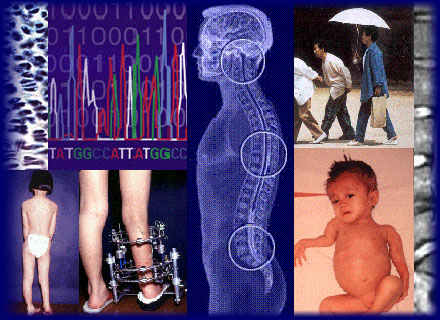 |

 |
Visit by Two Leading Harvard Academics to Advise on Skeletal Research Research Postgraduate Recruitment for the AoE
|
||||||
| HKU Scientists & Orthopaedic Surgeons Lead Search for Genetic Basis for Developmental and Ageing-related Skeletal Disorders | |||||||
As people live longer, they are more prone to suffer from bone disorders in their old age. Skeletal disorders are one of the world's most serious health problems that cause long-term pain and physical disability for hundreds of millions of people. Low back pain affects 60-80% of the ageing population worldwide and is the leading reason why people seek medical treatment. Degenerative low back disorders which can cause back pain are the third most common reason for surgical procedures and the second leading cause of sick leave. In 2000 over 300,000 workdays were lost in Hong Kong through these disorders and $200 million paid in workers compensation. Many questions remain unresolved in skeletal biology. It is still not clear how normal growth of cartilage and bone is regulated, how unfolded proteins within cells affect skeletal growth and maintenance and contribute to disorders, and what genetic factors favour degenerative skeletal disorders. Researchers at the Faculty of Medicine at HKU are leading a multidisciplinary research programme to discover and understand the genetic bases of degenerative disorders of the joints or back. The programme which is entitled 'Developmental Genomics and Skeletal Research', will receive $50M funding from the UGC as an 'Area of Excellence (AoE)' programme. Announcing the award, Professor Sir Colin Lucas, Chairman of the UGC AoE Sub Committee added, "The AoE Scheme is a very competitive and highly selective funding exercise and the Sub-Committee has applied very stringent standards in the evaluation of proposals. The two selected have clearly demonstrated a strong prospect for attaining international excellence and are areas which the UGC believes will help Hong Kong advance and compete internationally in the relevant fields." The programme is a model of cooperation between scientists and clinicians from HKU, HKUST, PolyU and OpenU combining diverse and complementary expertise The 18-strong team will employ a variety of state-of-the-art technologies in genomics, proteomics, cell biology and animal models to identify the genes, proteins and regulatory networks that are responsible for maintaining the integrity of the skeleton. Their goals are to identify genetic risk factors and understand the molecular bases underlying degeneration of the discs in the spine, osteoarthritis and other skeletal disorders.
The team of researchers are led by Director of the AoE programme, Professor Kathy Cheah , Chair Professor and Head of Biochemistry of HKU, and the Deputy Director Professor Keith Luk , Chair Professor of Orthopaedic Surgery of HKU. Kathy Cheah noted, "researchers are only at the beginning of dissecting the cause(s) of these old age related lower back disorders. The etiology is probably very complex as we still do not understand how normal growth of cartilage and bone is regulated, how unfolded proteins within cells affect skeletal growth and maintenance and contribute to disorders, and what genetic factors favour degenerative skeletal disorders." Prof. John Leong, former Chair of Orthopaedic Surgery and now President of the OpenU, who helped shape the programme and continues his involvement in the AoE as a collaborator, commented "this prestigious award highlights the importance of understanding musculo-skeletal disorders."
Among the 18 local team members on the project, 13 are from HKU: (Cheah KSE, Luk KDK, Chan D, Cheung KMC, Chu I, Huang JD, Kung HF, Jin DY, Sham MH, Sham P (visiting Professor from King's College, London), Shum DKY, Smith D, Song YQ, Yao KM, Zhou ZJ). Cross-inter-institutional members of the team include Prof. Donald Chang, Dr. King Chow and Dr. Mingjie Zhang (HKUST ), Dr. S.P. Yip (PolyU ) and Prof. John Leong (OpenU). The programme also involves collaborations with international leaders in the field. A key contributor to the programme will be the core facilities recently established in the HKU Genome Research Centre. "Success of this programme will contribute to placing Hong Kong at the forefront of biomedical research worldwide," commented by the Dean of Medicine, Prof. Siu-Kam Lam. |
|||||||

